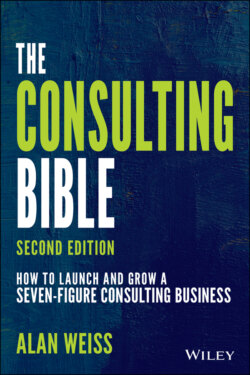Читать книгу The Consulting Bible - Alan Weiss - Страница 56
Value
ОглавлениеThis is the most overlooked aspect of conceptual agreement, but a crucial nuance, because here the buyer is actually stipulating the worth of the project, so you can demonstrate a dramatic ROI with your fee. For this reason, you must question about value relentlessly, until you've arrived at both business and personal impact of a successful project.
Examples of value might be:
Improved margins for the average new sale.
Improved profit per client annually.
More focus on strategy and less on tactics and failure work by senior management.
Value can sometimes be the same as objectives; for example, profit is both an objective and of high value. But profit has significant and varied impact: more investment in research and development, larger investor dividends, more favorable repute with Wall Street, building a reserve fund, and so forth.
Never accept the surface or obvious, but help the buyer to articulate the full range of value possible.
Questions for this include the following 10 inquiries:
1 What will these results mean for your organization?
2 How would you assess the actual return (on investment, assets, sales, equity, etc.)?
3 What would be the extent of the improvement (or correction)?
4 How will these results impact the bottom line?
5 What are the annualized savings (first year might be deceptive)?
6 What is the intangible impact (on repute, safety, comfort, etc.)?
7 How would you, personally, be better off or better supported?
8 What is the scope of the impact (on customers, employees, vendors)?
9 How important is this compared to your overall responsibilities?
10 What if this fails?
Hint: If the buyer asks why this is important, simply reply that the impact of the project will help determine joint priorities, scope, resources committed, and so on. There shouldn't be any suspicion that you're asking this to increase fees, because you've already established a trusting relationship. You can see the reason for the sequence, and why it's so vital to maintain it.
Conceptual agreement—objectives, measures, and value—are as simple as these past few pages suggest, but are as vital to your success in consulting as anything you'll learn in any book. You'll see later, when we discuss proposals, how they will enable you to briefly but powerfully create a win‐win proposition for your buyer.
And they create the basis for tremendous leverage.
